On Monday morning, Hong Kong media reported that the barricades around Admiralty would be removed after two-plus weeks of bulwarking pro-democracy protesters in their concrete campground near government offices. The evidence was right there on the tele: moving pictures of police clearing the roads! And so, after lunch, I found myself in a friend’s dad’s car going from Wan Chai in the direction of our final destination in the western Mid-levels. We had just gotten onto Queensway and could see Pacific Place, a luxury complex of business and commerce, when we encountered… a barricade.
As we were figuring the proper detour, middle-aged and slightly older men at the scene became suddenly animated by an unexplained rage. We exited the vehicle to this ruckus amid growing layers of interested and camera-phone-toting bystanders. As the men rushed in to dismantle and drag out the barricades, which scraped loudly against the asphalt, they were met by resistance in the form of young people, first one, then others, possibly students, who stood defiantly in front of vehicles. (Yes, the obligatory reference to Tiananmen Tank Man was overheard.) They sat in the middle of the road to form a human barricade:
No one should have been surprised at the resistance. After bunkering down in their cove of dissent, dozing in tents and showering in makeshift facilities, passionately, thoughtfully, and artfully pleading their case, in multiple languages, to anyone who would listen, did authorities really think the protesters — organized and motivated as they are — would quietly step aside to watch their movement extinguished by a giant-claw douter?
Every time authorities have tried to step in, the protests have flared as a result, like an angry flame. Two and a half weeks ago, they tried pepper spray and tear gas, inadvertently giving this movement its distinctive symbol – the umbrella. But popular support for these protesters was beginning to wane last week — at least among Hong Kongers, who increasingly see the protests as a nuisance — when the government made yet another boneheaded decision. It announced, then retracted on Thursday, a meeting with student leaders. Why? In a very non-rhetorical sense, why? Why, if you decide to schedule a meeting — option A – wouldn’t you go through with said meeting, maybe try to win a bit of positive press before using that momentum to cast the Hong Kong Federation of Students and Scholarism as stubborn, callow, and unrealistic? Why, if option B is to never engage, wouldn’t you actually not engage, and let the momentum slowly fade, the protest starved out by boredom, school, and work? Indeed, the worst thing the government could have done was option C: rescind a promised talk one day before the weekend. Predictably, protest numbers skyrocketed. Here’s what it looked like from my vantage point on Friday:
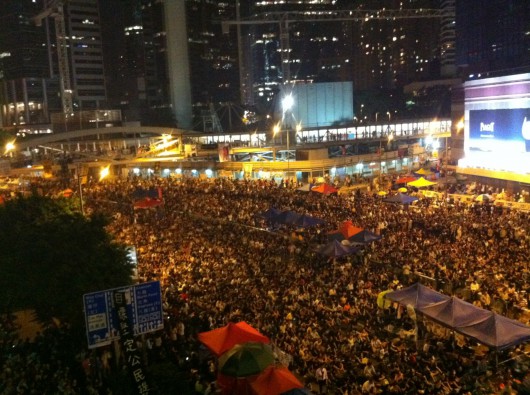
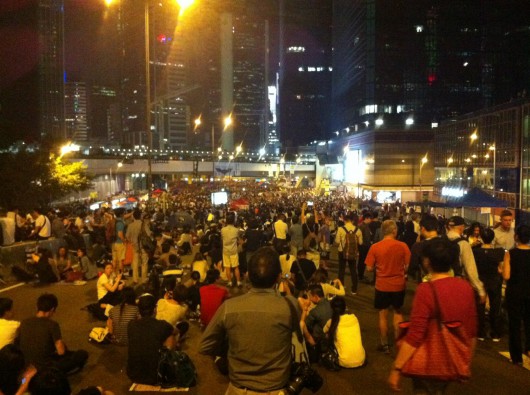
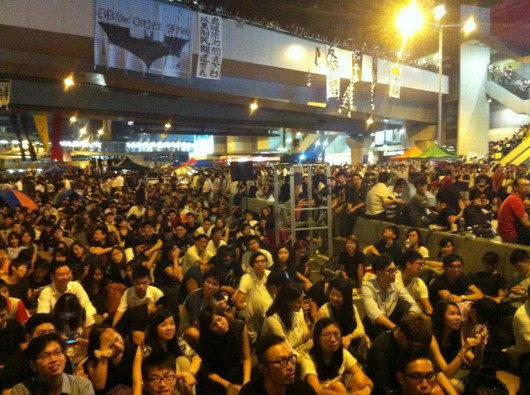
And then, today, while barricades were going down, they were being built — and deployed – just as quickly:
#HongKong #OccupyCentral protesters’ local solution to crackdown peril – bamboo barricades http://t.co/VS3TZfGATo pic.twitter.com/MfRBMbSHXW
— Phelim Kine 林海 (@PhelimKine) October 13, 2014
Students mix up cement in #causewaybay to reinforce new barricades after police dismantled some… http://t.co/6oppFy8Eh5
— Sofia Mitra-Thakur (@_sofiamt) October 13, 2014
Recent reports are that city officials have now gone to Guangzhou for a forum. Government… leaders… what are you doing?
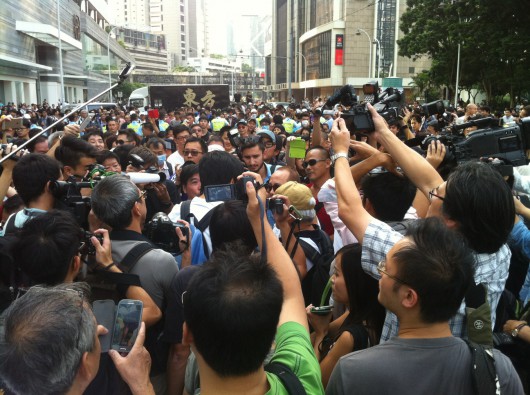
But here’s where it gets tricky. On the corner of Queensway and Tamar, the opposition was not reciting pro-government slogans, extolling the Communist Party, or Leung Chun-ying. They were upset*, sure, but their anger and frustration was directed at the protesters’ actions… not the values they represent, but the hard fact that they had incapacitated the day-to-day lives of many and threatened livelihoods. And all for what? The choice to elect leaders who, in the end, will still be beholden to Beijing? (This isn’t a popular reality, but Hong Kong relies on mainland China and will only rely on mainland China more in the coming years… but that’s a different story.)
*QUICK INTERLUDE: “Go fuck your mother,” an old man screamed at some Occupy protesters. Another man, also fairly senior and on the side of the anti-Occupy folks, blurted, “Don’t curse, don’t curse.”
They chanted, “Open the roads!,” “Clear the area!,” and “Rubbish!” (Thanks to Alicia for the translations.) Signs read, “Retake the road, I’ve suffered enough,” “Save my rice bowl,” and “Hong Kong is my home.” Some, I suppose it should be noted, spoke Cantonese with mainland accents; many others did not. On the other side, protesters sang “Congratulations to you” sarcastically. “Please leave peacefully,” a man in an orange shirt appealed, though it was unclear who he was addressing. “Please protest elsewhere.” He was expressing a sentiment I’ve heard often lately: fighting for what you believe in isn’t wrong, but preventing other people from making a living probably is.
How should we feel about these people? They are called the “anti-Occupy group,” but that term is problematic. It works on a literal level, describing those who oppose the folks occupying Central, but it has a ring of unpleasantness, doesn’t it? As if this nebulous group, in addition to being anti-protest, were also anti-justice, anti-democracy, and anti-Hong Kong. But let’s call them what they mostly are, shall we? Taxi drivers. Restaurant owners. Small business owners. Their spouses. People who understand the grass isn’t always greener on the other side, and who mistrust college students who lecture them about the future. This “group” is not a faceless, masked opposition against values that Westerners on Twitter hold dear. These are the people who will ultimately decide whether this movement moves forward or subsides, because they are the ones who are skeptical — never mind the spirit of the protesters, their optimism, their courage and grace – about whether they can sustain a 30 to 50 percent reduction in business.
Above on the overpasses, pedestrians peered at the action below, snapping pictures as if at a zoo. Underneath Pacific Place, in the Admiralty subway station, a poster extolled “New rail lines for a better Hong Kong” while advertisements cycled between Calvin Klein models and McDonald’s burgers. All the way home via public transport, we heard no chatter about the protests, which seemed to exist in a different realm altogether, a small but significant part of the city that created its own vortex while everyone else went about their day, now night, undisturbed by visions of democracy or the prospect of economic disenfranchisement.
And where do we go from here? Maybe hold hands and hope better decisions are made from the top to facilitate — not hinder – a resolution. No one wants to see Hong Kong fight Hong Kong.
As a postscript: a commendation for the Hong Kong police, from the low-level blue shirts to the plainclothes cops who are asked to rove the streets to find violence to defuse. They inserted themselves between pro- and anti- groups on Monday afternoon and basically kept the peace. There’s time yet for the police to bungle a future task, but so far they’ve performed admirably under difficult circumstances.
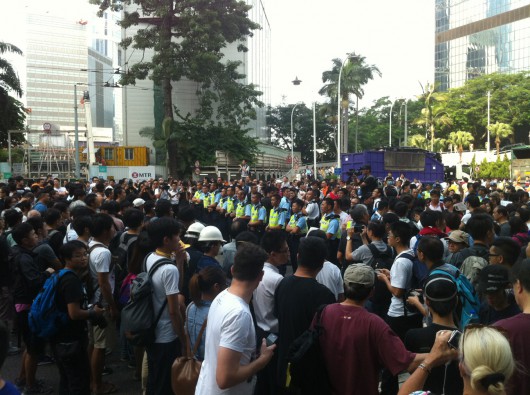
As another postscript, here’s how the main Occupy protest area looked during the daytime while skirmishes happened a few blocks away:

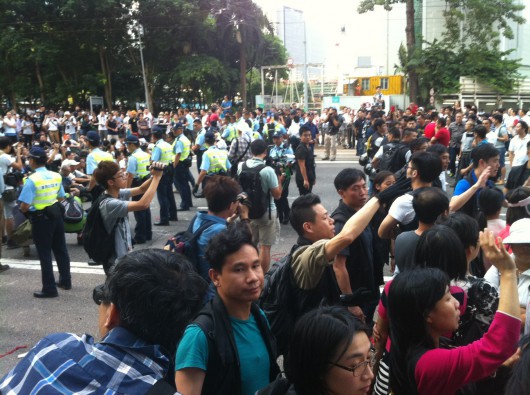
















































Excellent dispatch from Honkers Ground Zero. Great to see you reporting again. Thank you!
Great on the scene reporting. It’s nice to see an
attempt at some analysis beyond the “Hong Kong vs. China” narrative I have seen too much of.
Thanks for your presenting of HK’s situation! Especially for your objective comments! I’ve seen too much criticism or exaggerated discriptions, which defame Chinese image. Your report just reveals the reality. Hopefully the protest would end up in a peaceful way as expected.
Really excellent dispatch. From pictures to words are quite authentic and I can see your just attitude. I also agree with you about that “Option C” thing: government really behaved quite wrong here and made itself kinda hypocritical.
And is it necessary that in the end the god-know-who becomes the leader? Nothing will essentially change. Politics is always the same from the very beginning.
During protests, actual protests where you want to see change, there has to be an incovenience to those who haven’t picked sides. The purpose isn’t to hurt business owners, or anyone else, the purpose is for everyone to pick a side. Too many people don’t give a shit in the short term and when they realize the change has turned into a long term one it’s too late.
People have and will idly stand by if there were to be another Hitler. It’s as simple as that. At first you think it’s nothing, then you hope it’ll go away by itself, or hope it won’t affect you, after that you hope the inconvenience to you will be only be mild. But at some point you will have arrived in a world where you’re going down too, where suddenly you’re a young man being drafted into the army. Fighting for a cause you didn’t give a shit about.
And that’s also the reason why young people are doing the protesting and many older people don’t. They have something to lose and hope it won’t affect them. They hope it’s just a short term thing and business will go on as usual. After all, that’s all that is important at that point in life. Make a living and save enough for your children. Young people can still have hopes for the futures, no matter how futile those dreams may turn out to be.
In the end, the protestors have stood for something they believed in. They have made an effort to change the future for the better (in their eyes). But ultimately it’s not people who win, it’s money. And the money is across the border in the mainland.